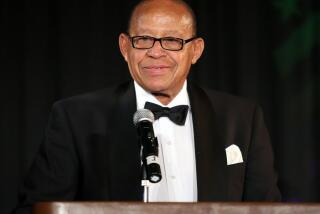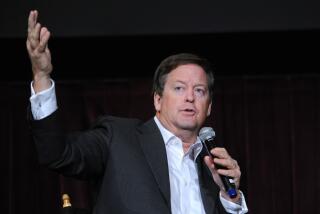TV host was behind ‘Red Light, Green Light’ game
- Share via
William “Engineer Bill” Stulla, an early Los Angeles children’s television show host who inspired a generation of Southern California baby boomers to drink their milk with his signature “Red Light, Green Light” game, has died. He was 97.
Stulla died in his sleep Tuesday evening at his longtime home in Westlake Village, his daughter, Kathryn Stulla Mackensen, said Thursday.
As the genial host of “Cartoon Express,” which ran weekdays at 6:30 p.m. on Channel 9 (then KHJ-TV) in Los Angeles, Stulla was a television fixture from 1954 to 1966. The show earned him two Emmy Awards.
Seated behind a model train layout, Stulla wore a blue-striped engineer’s cap and overalls, a red kerchief and his trademark horn-rim glasses.
Between cartoons, he would chat with his in-studio guests -- a boy and a girl from local schools -- read from a get-well list of young viewers who were sick, and talk to his audience about breaking bad habits such as not eating everything on their plates.
He’d give them a week to break each bad habit. And to illustrate how tough that could be, Little Mo, the Bad Habit Buster -- a model train with a determined face painted on the engine -- would be shown chugging up a steep incline and huffing, “I hope I can, I hope I can.”
But the highlight of the show for young viewers came when Engineer Bill and his two guests played “Red Light, Green Light.” The game, with his audience joining in at home, was simple:
As Stulla and his two guests sat with their milk glasses poised, an off-screen announcer, usually “Freight Train” Wayne Thomas, would cry out, “Green Light” -- the signal to start drinking.
When Thomas abruptly yelled “Red Light,’ they had to immediately stop drinking. The goal of the game was to finish the glass of milk without drinking on the red light.
That wasn’t as easy as it sounds: Wayne might substitute “Green Eyes” or “Green Grass” for “Green Light” and “Red Car” or “Red Pants” for “Red Light.”
“The guys in the studio calling the signal would try to [foul] me up as best they could,” Stulla told The Times in 2002, “and they did it fairly often and I’d have to say, ‘Oh, I’m sorry,’ ” as he dabbed his wet face with a napkin.
If the two children played the game perfectly, they would get a clang on a locomotive bell; if they goofed up, they got the lead bell (a dull metallic thud caused by hitting a section of pipe with a piece of wood).
“The kids didn’t goof very often,” said Stulla. “I was the one who always lost.”
Stulla was part of a group of children’s show hosts in Los Angeles in the ‘50s and early ‘60s whose ranks included “Skipper Frank” Herman, “Sheriff John” Rovick and Tom Hatten.
“We had a real rapport with the children,” Stulla told an audience at the Museum of Television & Radio in Beverly Hills in 1997. “I acted like I was just talking to one child, and that made it work. I was raising my 5-year-old daughter at the time, so it was easy for me. We never talked down to the kids; we treated them like little adults.”
Born in New York City on May 24, 1911, Stulla lived there for only a year before his father, a printer, uprooted the family to find work. Stulla called Erie, Pa.; Buffalo, N.Y., and Cleveland home in his early years.
At 18, Stulla was already a journeyman printer after graduating from high school in Denver. But he knew he didn’t want to follow in his father’s footsteps. One day while riding home in a streetcar, he saw an ad announcing classes in radio at the University of Denver.
After six months of radio classes, Stulla landed his first broadcasting job on KFEL, a 500-watt Denver station.
He soon moved over to KOA, a 50,000-watt NBC affiliate in Denver, as an announcer and writer for five years.
In 1939, he moved to KFI-AM, an NBC affiliate in Los Angeles.
At KFI, Stulla hosted a music program and also served as announcer on “The Rudy Vallee Show.” But when the Vallee show ended, Stulla abandoned his desire to be a network announcer.
Stulla enlisted in the Army Signal Corps during World War II. He was assigned to Armed Forces Radio Services and spent most of his time in the China-Burma-India theater, where he helped set up 15 radio stations and taught crews how to run them, as well as announcing, writing and hosting programs.
After the war, Stulla returned to his old job at KFI, where he created and hosted a weekday show for women called “Ladies’ Day.” After quitting KFI in 1950, Stulla changed the name of the show, a mix of music and audience-participation games, to “Parlor Party.”
It aired on NBC-TV for about a year and a half before he and the show moved to KHJ-TV.
“Cartoon Express” was KHJ’s answer to the popular “Lunch Brigade” with Sheriff John on KTTV Channel 11.
Stulla was still hosting “Parlor Party” in late 1954 when he discovered that the station was holding auditions to find the host for a new show to be called Ranger Ed, which was a poor imitation of Sheriff John.
“I said, ‘I’ve got an idea for a better show; it’s a railroad show,’ ” Stulla recalled. “I said, ‘I want to be an engineer and run trains and play cartoons,’ because I knew the station had bought some cartoons.”
Baby boomers’ parents had Stulla’s wife to thank for motivating their children to drink milk.
Ruth Stulla, a radio producer, had created the “Red Light, Green Light” game to induce their daughter, Kathy, to drink her milk.
She had borrowed the idea from Kathy’s nursery school teacher, who yelled “Green Light” to get the children to begin picking up their play equipment on the school yard and “Red Light” to stop.
After retiring from broadcasting in 1966, Stulla became a stockbroker and later settled into his waterfront home in Westlake Village.
Stulla’s wife of 52 years, Ruth, died in 1999.
His daughter is his sole surviving immediate family member.
A memorial service will be held at 11 a.m. Aug. 27 at the Westlake Village Inn, 32001 Agoura Road, Westlake Village.
--
More to Read
The complete guide to home viewing
Get Screen Gab for everything about the TV shows and streaming movies everyone’s talking about.
You may occasionally receive promotional content from the Los Angeles Times.






